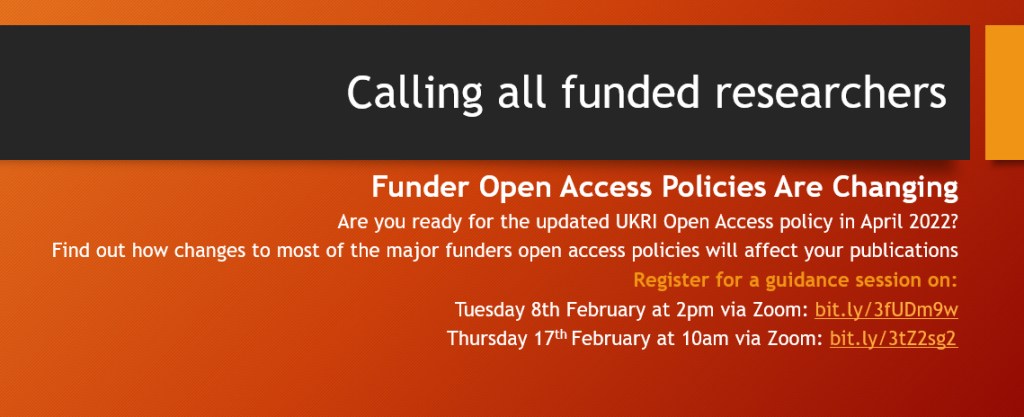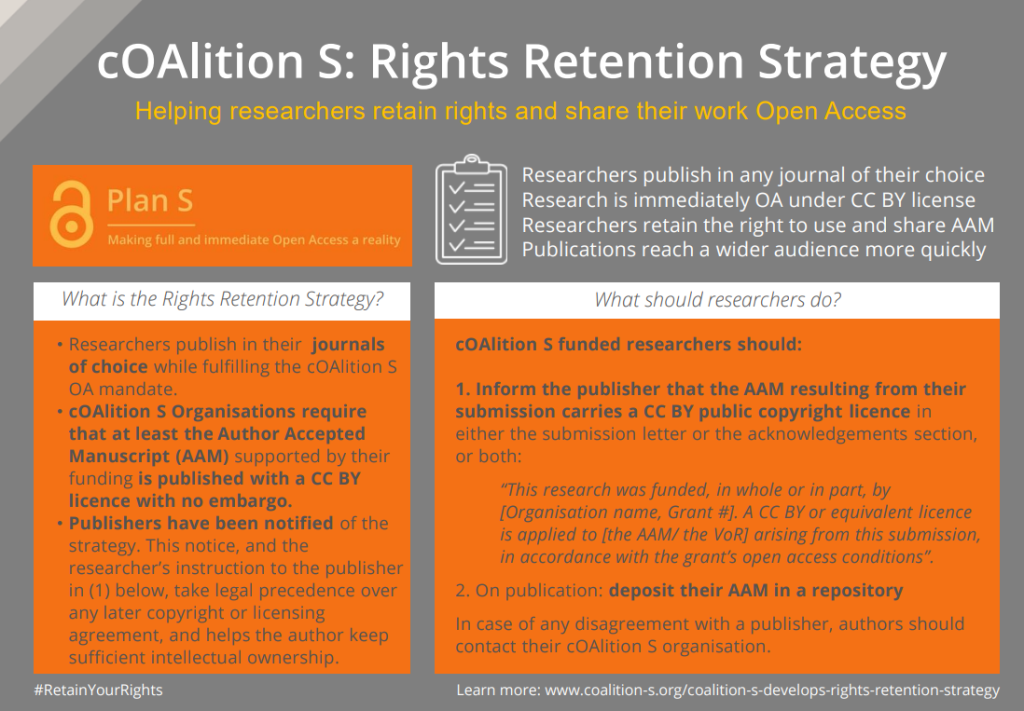
Key Points
- JISC / UK Universities are currently engaged in negotiations with Springer Nature to agree a sustainable ‘Read & Publish’ deal.
- Springer Compact, Nature research journals and Palgrave titles are included in the publisher portfolio.
- Springer Nature have confirmed that there will be a grace period of read access to subscription content and a continuation of Springer Compact open access publishing until the end of March 2023.
- An agreement is important for researchers to fulfil funder open access policy requirements. If an open access journal or APC (article processing charge) payment is not available, authors can meet their obligations by using a rights retention statement at the point of submission in hybrid journals. Releasing the accepted manuscript immediately at the point of publication in the repository with a CC-BY licence will be compliant for UKRI.
- Individual payments by the University for all APCs in this portfolio may be withdrawn if negotiations conclude without agreement. Further information will be circulated if this scenario occurs.
- If the sector walks away from the negotiation and suspend subscriptions, we will provide additional inter-library loan services to provide research reading. Access to historical subscription materials will continue to be available under agreed retention rights. We recommend that you install a browser extension plugin to your device for seamless access to articles. Try CORE Discovery, or Unpaywall for open access versions, or LibKey to obtain access to articles provided by Swansea University Library.
Read more about the JISC / Springer Nature Open Access Agreement Negotiation for the UK
Why do I need to know about this negotiation?
The transition to open access publishing is fulfilled through a range of transformative agreements in consultation with a wide selection of stakeholders. This supports the wide dissemination and free access to our research and helps to constrain costs, accelerate open access and increase transparency. Universities in the UK spend around £30 million a year with Springer Nature, the second largest publisher of all UK research.
The current deal with Springer ended on 31 December 2022 and JISC are acting on behalf of the sector in the current negotiation for an expanded read and publish agreement. If successful, an acceptable agreement will cover the whole Springer Nature journal portfolio – Springer Compact journals, Palgrave journals, Nature journals and their fully open access titles.
Why do we need an agreement?
- To facilitate ‘read’ access to published journal content in their portfolio.
- A new transitional Read & Publish agreement will provide open access publishing for UK authors in Springer Nature journals at no direct cost to the individual researcher.
Many funders require their open access funding to be used in journals that are part of a transitional agreement. They are driving change from an individual and institutional payment model (article payment charges and library journal subscriptions) to one where the library budget fairly supports the publishing services at institutional level. Springer Nature will be paid for providing access to their journal portfolio and for corresponding authors to publish reviews and primary research articles under one single agreement.
However, most funded researchers are not required to pay for open access in Springer-Nature portfolio journals. The self-archiving route for the author accepted manuscript (AAM) via a repository is still available for publishing in hybrid (open access and subscription) journals. To meet funder requirements UKRI authors should continue to use a rights retention statement at the point of submission. This will enable immediate open access by depositing the accepted manuscript with a CC-BY licence in Cronfa via the Research Information System (RIS).
Rights Retention
Include this statement in your submission cover letter and the acknowledgement statement:
“For the purpose of Open Access, the author has applied a Creative Commons Attribution (CC-BY) licence to any Author Accepted Manuscript arising from this submission.”
We strongly encourage all authors to utilise this zero-cost publication route in order to support the ongoing negotiations. Nature open access costs are remarkably high compared to the average cost of APCs and price restraint is required.
What happens next?
Springer Nature have confirmed that there will be a grace period of ‘read’ access to subscription content and a continuation of Springer Compact publishing until the end of February 2023. Individual payments by the University for APCs in this publisher portfolio may be withdrawn if negotiations conclude without agreement. Further information will be circulated if this occurs.
We will continue to update our website and the Effective Research Publishing Handbook as information becomes available.
Contact us: LibraryResearchSupport@swansea.ac.uk















